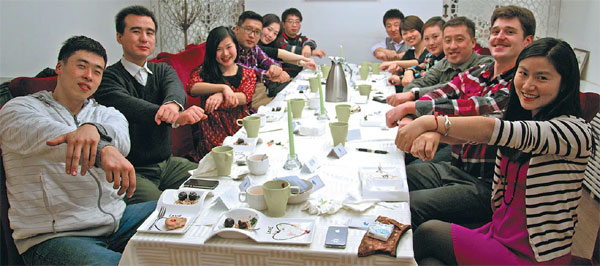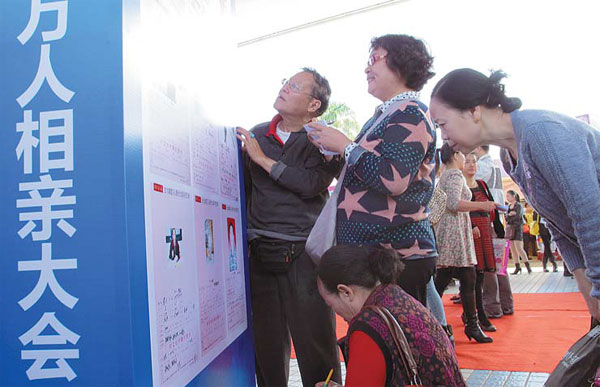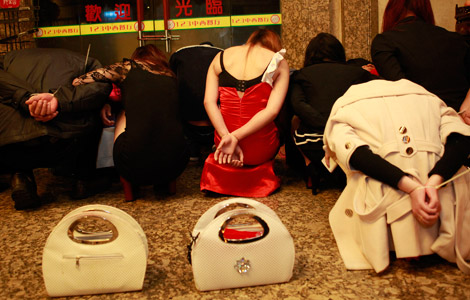Much ado about shengnu
Updated: 2014-02-12 14:48
By Valerie Ng and Erik Nilsson (China Daily USA)
|
||||||||
There has been a great deal of hype in China about white-collar females of a certain age who remain unwed. But the numbers reveal this demographic is actually relatively rare, Valerie Ng and Erik Nilsson discover.
The shengnu, or "leftover women", have been a big deal in Chinese society - despite being a smaller part of the population than perhaps most think.
There's the TV series Old Women Should Get Married and the reality matchmaking show If You Are the One. Media have minted terms like "the shengnu economy" to analyze how successful single women older than 27 spend their cash.
|
Activities are organized by many matchmaking companies to widen members' friend circles. Pictured is a dinner with games held by Coucou8, a matchmaking company in Beijing. Provided to China Daily |
The music video by and about shengnu, No House, No Car - a stinging retort to the popular No Car, No House music video by blue-collar Chinese bachelors - was viewed more than 1.5 million times within two days after it was uploaded to the Chinese video site Youku on International Women's Day in 2011.
In that time, it also garnered more than 20,000 downvotes versus about 3,400 upvotes, plus more than 5,600 comments - most of which derided the lyrics' "gold-digging" pathos.
But the women behind No House, No Car declare they don't care in the lyrics: "You can call me a gold-digger. I won't feel hurt."
They'd likely anticipated a backlash since the song contains such lines as: "You only drive a lousy BMW"; "if you don't have a car, if you don't have a house, hurry, move aside, don't block my way"; and "don't expect to get a beauty in bed".
But the buzz surrounding shengnu is seemingly larger than the group. And in fact, China's leftover women are relatively rare, especially compared with their global peers.
Fewer than 10 percent of Chinese women in their 30s are unmarried, the United Nations' World Marriage Data 2012 report shows. Only 7.4 percent of women between 30 and 34 are single, while those aged 35-39 account for 4.6 percent.
The figures are much higher in comparable countries, such as Asian nations with similarly traditional values.
More than 39 percent of Japanese women in their early 30s remain unwed. It's nearly 22 percent in South Korea and more than 28 percent in Singapore.
Looking westward, the figures exceed 38 percent for the United States. And more than half of British women in the age bracket remain single.
Reports say most Chinese shengnu are concentrated in metropolises like Beijing and Shanghai, where development is on par with wealthy countries.
Beijinger Amy Yang shows that shengnu aren't necessarily as materialistic they're sometimes made out to be.
Yang's boyfriend is less successful than her - far less.
And she's happy with him. But her parent's aren't.
"My family and friends try to arrange matchmaking sessions for me," the 31-year-old says.
She was scheduled to meet another potential suitor the weekend she was interviewed.
"My boyfriend isn't a graduate. He draws a salary of about 4,000 yuan ($660) a month," she explains.
"If not for my parents and societal pressure, I'd be content with just being with him or even staying single."
Yang has a post-graduate degree from Peking University, one of the country's most elite schools, and does marketing for a multinational.
Her parents insist her heartthrob "isn't good enough", she explains.
She believes it's easier for "brainless beauties or those who pretend to be without much gray matter" to nab husbands.
Yvonne Oh (not her real name) also feels pressure to tie the knot.
The 31-year-old general manager of a foreign organization enjoys a fulfilling career and active social life in Beijing. But her family and friends have decided - make that decided for her - that she's not happy.
"Some people, including my family and friends, think I'm unhappy being single. But that's not the case," she says.
"I lead a full life and occupy my spare time by reading the books I like, hanging out with friends and going for short trips. What's important is that my time is very flexible."
Beijing-based author Roseann Lake, who has written much about shengnu, explains that if a Chinese woman wants to "ensure" she gets married, numbers seem to indicate that she simply has to wait around long enough.
"China actually has one of the highest female marriage rates in the world. This 'wait around' approach isn't one I'd recommend, however," she says.
"Every woman has an internal 'happy compass' of what she knows will and will not be conducive to her well-being. She needs to listen to it and respond accordingly.
"I also think it's advisable to disregard any lengthy lists of what prospective mates must and must not have."
But this principle defies the matchmaking networks forced upon females by family, friends, employers and colleagues. That includes the groups of parents who gather in parks to swap stats on their children's economic statuses and physical attributes.
The expectation to marry while marketable pushes some women to preempt their "expiration dates" by marrying "beneath" them - that is, to poorer or younger men.
University of Hong Kong sociologist Sandy To says leftover women result from the persistence of China's patriarchal past. Many of these women have been rejected by men who feel more comfortable with less accomplished wives. Others struggled with relationships in which boyfriends expected them to spend less time at work and more on home life.
Take the recently publicized case of a Nanjing Normal University PhD student who sought a boyfriend to accompany her to her hometown during Spring Festival. Problem is, rather than celebrate smart as sexy, about 30 percent of Chinese men don't want to marry a woman with a PhD, an online Modern Express survey shows.
"These women are being forced to develop new strategies when it comes to courtship, dating and partner choice to avoid becoming shengnu," To says.
She researched the topic from 2008 to 2012 for her University of Cambridge doctoral thesis.
But early marriages often lead to divorces later.
The 2011 Chinese Marriage Situation Survey found nearly 45 percent of interviewees were apprehensive about marrying at all, since one in five couples divorce.
Another 42 percent worried about losing their freedom. And 37.5 percent dreaded family responsibilities. An additional 31 percent were anxious about housing.
Some expressed domestic violence fears.
Lake cites Facebook COO Sheryl Sandberg. Sandberg's first marriage began when she was 25, in accordance with her parents' desire. She divorced after a year. Sandberg remarried nearly a decade later, and she and her husband are now one of the tech world's most celebrated couples.
"Why did this marriage work better than the first? I would venture it has something to do with the fact that she went into it on her own terms and at her own time," Lake says.
Another advocate of choosing life partners slowly and wisely is Los Angeles' former deputy mayor Joy Chen. The Chinese-American wrote the book Do Not Marry Before Age 30.
"We should not just try to find a 'Mr Right Now', but a 'Mr Right Forever'," she said in an earlier interview with China Daily.
That's Oh's plan. She'll settle down - but only with Mr Right.
"I hope to meet the one destiny brings to me," she says. "It'd be even lonelier if I have to spend the rest of my life with someone who's not my match."
But Yang, the marketing executive, says she's succumbing to pressure. Her New Year's resolution is to get married.
"I fall into the group of people who'll get married for the sake of getting married," she explains. "And, to please my parents, I'll settle for someone 'good enough' by their standards."
Contact the writers through valerie@chinadaily.com.cn.
|
Groups of parents gather in parks to swap stats on their children. Shi Yan / For China Daily |
(China Daily USA 02/09/2014 page8)
Most Viewed
Editor's Picks

|

|

|

|

|

|
Today's Top News
Wine critic to start world tour in Beijing
China sends contingent to US-Thailand drill
Tokyo unveils armed forces reforms
Old palace columns coming home
Liaison mechanism to link Straits
Kerry seeks to 'rule out' possibility of conflict
Official cars to be auctioned in NE China city
Joint operation ensnares poachers
US Weekly

|

|














